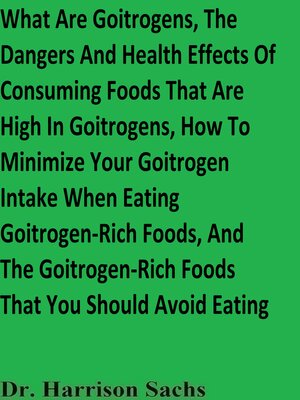What Are Goitrogens, the Dangers and Health Effects of Consuming Foods That Are High In Goitrogens, How to Minimize Your Goitrogen Intake When Eating Goitrogen-Rich Foods, and...
audiobook (Unabridged)
By Dr. Harrison Sachs

Sign up to save your library
With an OverDrive account, you can save your favorite libraries for at-a-glance information about availability. Find out more about OverDrive accounts.
Find this title in Libby, the library reading app by OverDrive.



Search for a digital library with this title
Title found at these libraries:
| Library Name | Distance |
|---|---|
| Loading... |
This audiobook is narrated by a digital voice.
This essay sheds light on what are goitrogens, demystifies the dangers and health effects of consuming foods that are high in goitrogens, elucidates how to minimize your goitrogen intake when eating goitrogen-rich foods, and reveals the goitrogen-rich foods that you should avoid eating. Goitrogens are plant-based compounds that are a type of antinutrient. The "three main types of goitrogens encompass goitrins, thiocyanates, and flavonoids". Other types of goitrogens encompass "soy isoflavones, glucosinolates, thiocyanates, thiouracil, thiourea, propylthiouracil (PTU), carbimazole, and methimazole". "Goitrins and thiocyanates are produced when plants are damaged, such as when they are lacerated or chewed. Flavonoids are naturally present in a vast variety of foods". Goitrogens are pervasive in a myriad of fruits, vegetables, and unfermented soy products. The intake of goitrogen-rich foods can severely undermine thyroid gland functions. "Foods that contain goitrogens are able to disrupt thyroid gland function by inhibiting your body's ability to use iodine. More specifically, goitrogens can block the process by which iodine is incorporated into the key thyroid hormones thyroxine (T4) and triiodothyronine (T3). They also inhibit the actual release of thyroid hormone by your thyroid gland and disrupt the peripheral conversion of the thyroid storage hormone T4 into the active thyroid hormone T3". In addition to disrupting the production of "thyroxine and triiodothyronine," goitrogens "may interfere with thyroid stimulating hormone (TSH), which helps the thyroid gland produce hormones". Thyroid stimulating hormones are churned out by the pituitary gland. The production of thyroid stimulating hormones prompts the thyroid gland to produce more thyroxine and triiodothyronine. "When the thyroid gland's functions are disrupted, it has trouble producing the hormones that regulate your metabolism. This can lead to problems controlling body temperature, and heart rate".







